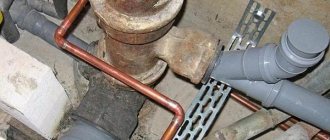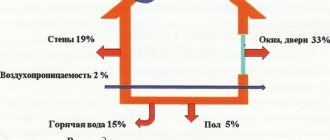Preparation
It doesn’t matter what you heat your house with - a boiler, a furnace, a heat pump or air conditioners. Heat sources need to be prevented before the heating season:
- Dirty boilers and furnaces are ineffective. A large amount of heat goes into the pipe because, due to contamination, it cannot effectively transfer it to the water in the heating system.
- A heat pump will run less efficiently if it is low on refrigerant or has dirty oil. During downtime, sediment may appear in its pipes, plugs may form, etc. they will reduce its efficiency.
- Electric convectors must be thoroughly washed - during the summer a lot of dust accumulates on their internal parts. Which does not allow the air to be heated effectively.
- If you are going to use air conditioners to heat your home, you should also prepare them. Be sure to clean the outdoor and indoor units. Check the quality of work, how well the air conditioner blows and heats.
We save heat at the enterprise
You can save heat in enterprises in the following ways.
- The use of heat-saving polyvinyl chloride film, which is mounted in the interframe space of the windows. These are so-called energy efficient windows.
- The use of canvas curtains at the entrances to production premises and workshops.
- Glazing of industrial premises.
- Enterprise heating inspection
- Calculation of thermal loads
In addition, it is necessary to take the measures described above, that is, glazing the premises, insulating the walls, eliminating cracks in the windows, etc.
Save heat in the office
Separate heating
Experts advise setting your own temperature regime for each individual room or room. This way you can save a little on heating costs.
For example, in the kitchen you can set the temperature 1-3 degrees lower than in other rooms - the food being prepared and electrical appliances turned on compensates for this difference.
The same goes for bathrooms, storage rooms, and other rooms where you don’t spend a lot of time. Stay indoors for 5-10 minutes. In which the temperature is 2-3 degrees lower than in the rest of the house. Will not cause you any discomfort.
Starting heating - timing
While most of the country's private households are equipped with autonomous heating systems, most apartments are connected to centralized systems. Heat supply periods for apartment buildings are regulated in the following documents:
- Decree of the Government of the Russian Federation No. 354 of May 6, 2011;
- Federal Law No. 190 of July 27, 2010 “On Heat Supply”;
- SanPiN 2.1.22645-10.
The timing of starting heating in houses depends on the region. Also determining factors are forecasts of weather forecasters and established weather conditions. The temperature value that is considered acceptable is 19-21 ⁰С. In rooms where small children and elderly people are constantly present, there is a slightly different standard - 1-2⁰С higher.
The right to start the heating period exists all year round. Services are required to start heating the next day after the end of a period of 5 days during which the average daily temperature did not exceed +8⁰C.
The command to supply heat is given by local governments. The date is determined by the relevant resolution, which is published on the official website of the city or district administration. Management companies and homeowners associations do not have the right to start heating at their own discretion.
Poison the air!
Air pockets can form in radiators and heated floors over time. They impair the efficiency of the heating system and increase the consumption of gas, electricity and other energy carriers.
Immediately after starting the heating system, check how efficiently it works. Try bleeding air from radiators or heated floors. Read more about that. Read how to do this in the articles “How to remove air from a warm water floor” and “How to properly bleed air from a heating radiator.”
If you have radiator heating, do not forget to check it at least once a month. Pay attention to how efficiently radiators heat. is there a temperature difference in their lower and upper parts.
Economical heating systems for a city apartment
It should be recognized that economical heating is not always an abstract concept. Such systems actually exist today and everyone has the right to make their own choice as to what to give preference to. The main aspect in this case is the minimum consumption of fuel consumed by heating devices and equipment to achieve the required temperature. For residents of city apartments, there is no alternative to gas and electric heating. For private houses and cottages there are much more options with a choice of views. The diagram shows a schematic diagram of gas heating in an apartment.
A city apartment is a space limited by building structures and communications. In addition, when organizing decentralized heating, the opinions of neighbors and other residents of an apartment building should be taken into account. Gas generators and pyrolysis boilers are not suitable for a city apartment, as is the option with air heating. The only possible options are gas, water, or electricity. Gas and electricity in our homes are the only available types of fuel and energy that can be used for their intended purpose.
Traditional for many of us, water heating is considered the most acceptable and practical. Gas, unlike electricity, is almost always available in the mains.
Important! Compared to electricity, the cost of energy consumption when heating with gas is much higher, despite the high efficiency of electric boilers. In this regard, gas significantly outperforms electricity. Moreover, the cost of electric heating in accordance with current tariffs is neither more nor less than 4,000 rubles/Gcal.
Even if you managed to install a super-economical electric boiler equipped with a control system, your electricity bills will unpleasantly surprise you at the end of the month. You will have to save on your own household needs. Electricity for a city apartment, especially considering the length of the heating season in our country, remains an expensive pleasure for heating residential premises. Electric household heating devices can be used as an auxiliary measure. Electric boilers, convectors and household heat guns are mainly used to maintain optimal temperature, or to create a high temperature in the apartment at a certain moment.
Be sure to read: how to pay less for heating?
Warming the emptiness
If you are leaving home for several days, it is not practical to heat it. But it doesn’t make sense to completely turn off the heating - warming up a cooled building will take more than a day. Leave the heating system in operating mode, but set it to 15-18 degrees.
If your family does not spend some part of the time at home (parents at work, children in kindergarten or school), you can reduce the temperature in the house by 3-5 degrees during this time. The most convenient way to do this is with a controller installed on the heat source or in the distribution cabinet.
The controller is not a cheap pleasure, but it will save you from constantly changing the temperature manually. And due to savings on heating, it will pay for itself over time.
Saving heat in a private home
For the greatest efficiency in saving thermal energy in a private home, as in any other facility, it is necessary to take a set of measures.
Such measures in this case include the following methods of heat conservation.
- Sealing windows - as practice shows, up to 40 percent of the heat can escape from the house through windows. If the windows are old, wooden, then for insulation you can use self-adhesive insulation and seals made of foam rubber, polyethylene foam and other heat-insulating materials. Even sticking tape on the cracks can make windows warmer.
- Using the same principle, it is necessary to eliminate the gaps between the doors and the door frame.
- If there are gaps between the door frame and the walls, they must be filled with foam.
- When replacing old windows, preference should be given to models with two or even three double-glazed windows. Such windows are more expensive, but quickly pay for themselves.
We save heat in our private home
- Apply heat-saving film to window glass.
- During periods of strong winds and cold weather, windows can be covered with bubble wrap.
- To reduce heat loss through the front door, it is necessary to insulate it or install an additional door.
- Significant heat savings will be achieved by insulating walls with thermal insulation materials such as mineral wool, polyurethane foam or extruded polystyrene foam. The thickness of the insulation should be selected individually - depending on the region, as well as the material and thickness of the walls.
- When insulating the roof and walls from the outside, do not forget about insulating the foundation.
- Finishing them with heat-insulating plaster can also reduce heat loss through the walls.
- The use of “warm” wallpaper, for example, cork, is another effective way to insulate walls from the inside. Note that cork can be used not only on walls, but also on the floor. As a result, the latter will become not only warm, but also pleasant to the touch.
How to save heat in a wooden house
- An important measure to save heat in a private home is floor insulation. If the floor is wooden, on joists, then between the joists it is necessary to lay thermal insulation material (mineral wool, expanded polystyrene, expanded clay, ecowool, or others). If the floor is concrete, thermal insulation boards are laid under the screed. Another way to insulate the floor is to make a screed made of expanded polystyrene concrete. If the floor is wooden, you can also make a dry screed from expanded clay and gypsum fiber boards.
Saving heat in the apartment
Fuel selection
This method of saving on heating is suitable if you use a solid fuel boiler, fireplace or stove.
Every fuel has a calorific value. This indicator shows that. How much thermal energy is released during combustion and can be used to heat water or coolant.
Compare the cost of different types of solid fuel in your region and their calorific value. Choose the most profitable option and use it. Here is a comparison table:
| Fuel | Heat of combustion, MJ/kg | Fuel | Heat of combustion, MJ/kg |
| Wood granules (pellets) | 18.5 | Anthracite | 26,8…34,8 |
| Dry firewood | 8,4…11 | Brown coal | 13…25 |
| Dry birch firewood | 12.5 | Brown coal (briquettes) | 20.2 |
| Oak wood | 19.9 | Brown coal (dust) | 25 |
| Spruce wood | 20.3 | Donetsk coal | 19,7…24 |
| Wood green | 6.3 | Charcoal | 31,5…34,4 |
| Pine wood | 20.9 | Coal | 27 |
| Peat | 16.3 | Coking coal | 36.3 |
| Fibrous peat | 21.8 | Kuznetsk coal | 22,8…25,1 |
| Milled peat | 8,1…10,5 | Chelyabinsk coal | 12.8 |
| Peat crumb | 10.8 | Ekibastuz coal | 16.7 |
Advice
It is most profitable to purchase firewood, pellets or coal before the heating season. When demand for them falls. This way you can save additional money on heating your home.
Changing the ventilation system
Few people pay attention to the fact that a lot of heat is lost during ventilation. Warm air is already thrown out into the street, and cold air takes its place. To reduce costs, you can use a recuperator.
In fact, this is the most common heat exchanger, using the energy of exhaust air to heat the supply air. Using this device allows you to pass already heated, but still fresh air into the room. This is a great way to save costs by almost 2 times.
In addition, in order to efficiently consume energy, special ventilation grilles can be installed in the room with the ability to adjust the size of the openings: in winter and in cold weather they are made as narrow as possible, in summer they are widened to the limit.
Free access
When using a radiator or convector heating system, certain rules must be followed.
Never cover radiators and convectors with furniture or curtains. They will obstruct the flow of infrared radiation from the heating device. Due to this, heating efficiency can drop by 40-60%!
Do not install continuous decorative screens on batteries. They will also interfere with efficient heating of the house and natural air circulation.
If you are just planning to make a radiator heating system. make sure that batteries are placed where they are needed in compliance with all regulations. Correct installation of heating radiators will save up to 20% on home heating costs!
Saving heat in an apartment building
Heat savings in apartment buildings can be achieved in the following ways.
- Installation of door closers on entrance doors and use of double doors.
- Mandatory glazing of premises and elimination of cracks.
- Replacement of old windows with modern double glazed windows.
- Thermal insulation of the building facade.
- Optimization of ventilation systems, thereby reducing the loss of heated air.
- Since heat rises, it is necessary to insulate the roof and ceiling. You can even use reeds or sawdust to insulate the ceiling.
- Behind the heating radiators it is necessary to install a heat-reflecting screen, for example, made of penofol. As practice shows, this procedure allows you to increase the temperature in the room by at least one degree.
Learn about priority measures to improve the energy efficiency of buildings in accordance with the requirements of the Ministry of Construction.
Insulation of MKD facade
- Keeping radiators clean - this measure also eliminates heat loss emitted by radiators.
- Do not cover batteries with thick curtains, furniture or other objects.
- Be sure to close the windows with curtains at night.
- Insulate heating pipes with thermal insulation, even if they only pass through heated rooms. The heat transfer of radiators is higher than that of pipes, so thermal insulation will reduce heat loss.
- To ventilate rooms, use not vents, but supply valves that are installed on windows or mounted in walls.
Measures to save thermal energy
Ventilate properly
If the house does not have a ventilation system, many people leave one or two windows open for winter ventilation. Open windows in winter work like a vacuum cleaner - they pull warm air out of the house and money out of your pocket.
It is best to open the window for 2-3 minutes several times a day. This will be enough to bring fresh air into your home. But the house did not have time to cool down. In addition to saving on heating, you will reduce the risk of getting sick due to drafts or temperature changes.
A few minutes in this mode is enough to bring in fresh air.
How to dispute a heating bill?
If you have identified irregularities in the calculation of heating fees, then you can appeal the actions of the organization that issued the invoice by contacting the territorial office of the State Housing Inspectorate. Naturally, you must substantiate and document your claims.
The invoice for heating must be paid in any case, since this is the responsibility of consumers. After payment, you can submit a written statement to the management of the management company or cash settlement center that issued the receipt. If the error in the accruals was unintentional, then when it is discovered, they will meet you halfway. You will need to write a claim in which you demand the return of the overpaid money, or set it off against future payments or make a recalculation. But before filing a complaint, make sure that there has been no increase in tariff.
In case of repeated incorrect calculation, you must file a complaint with Rospotrebnadzor (Federal Law of May 2, 2006 No. 59-FZ “On the procedure for considering appeals from citizens of the Russian Federation”).
You don’t have to go there in person and waste your precious time. The complaint is very simple and can be easily filed online via .
If your demands have not been satisfied, then after filing complaints with the State Housing Inspectorate or Rospotrebnadzor, you can apply to a court of general jurisdiction to resolve the controversial issue.
The following must be attached to the claim:
- documents that confirm the right of ownership or ownership of residential premises;
- receipts for accrual and payment of utilities;
- a copy of the application to the Criminal Code or supervisory authorities;
- a receipt confirming payment of the state duty.
All documents must be submitted in two copies, the second of which will then be sent to the utility service provider.
Alternative energy sources
Heat pumps. New projects are increasingly using heat pumps - they take energy from the air, soil or groundwater and provide it with heating and water heating. At the start, they are more expensive and require a small amount of electricity to use, but the fuel is free, and the external environment is not polluted, which is attractive from an economic and environmental point of view. They are of several types, depending on where they take the energy from and where they transfer it to. Most often these are air and soil pumps.
Solar panels. What previously seemed like science fiction is now being successfully used. Today, solar collectors are able to provide hot water even in winter. Their main types are flat and tubular. Some are more efficient in the summer, while others are able to operate without heat loss all year round.
Solar energy is used as an additional resource to the main fuel, and using heat pumps they think of a safety net, for example, by providing a backup gas boiler.











